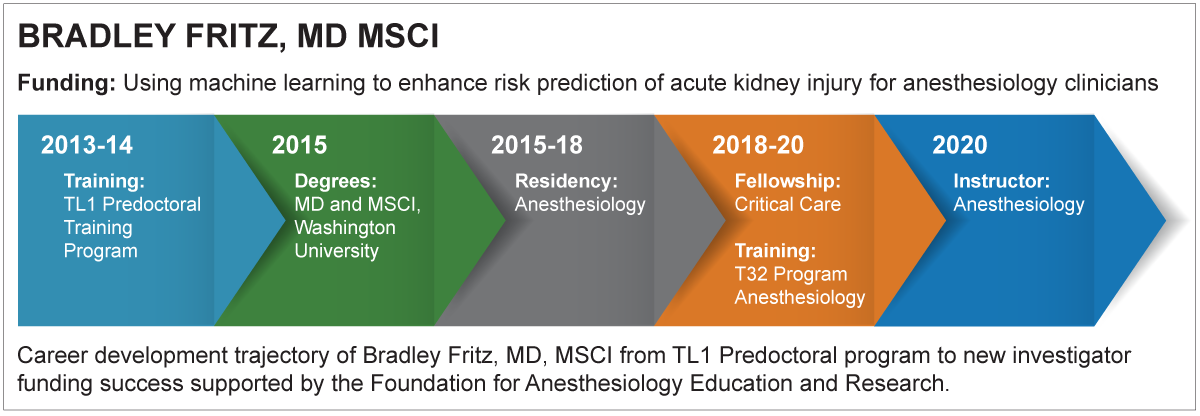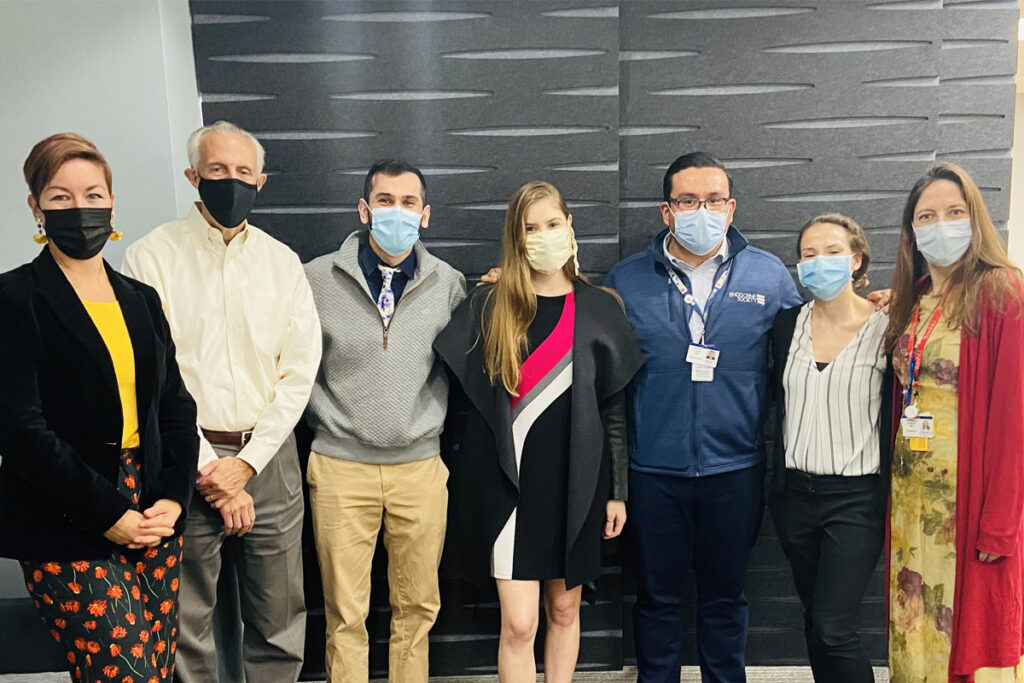The Need is Real
One could argue that there has never been a more essential time to pursue a research-based career in clinical and translational science. With the onset of the current pandemic in tandem with the rapid release of new medical technologies, a well-trained translational science workforce is necessary for the future of public health.
And, the need is real. According to the NIH Physician-Scientist Workforce Work Group, up to 1,000 trainees will need to enter the physician-scientist training pipeline each year in order to sustain the workforce1. Candidates are encountering more barriers than ever, such as leaky training pipelines, educational debt, and an extensive time horizon until scientific independence.
The current outlook requires active support, making the program goal “to train and cultivate the translational science workforce” of the NCATS Clinical and Translational Science Awards (CTSA) Program, more important than ever.
Supported by the CTSA Program, the Washington University Institute of Clinical and Translational Sciences (ICTS) actively fosters the development of the next generation of translational scientists through two training programs, the KL2 and TL1 awards. Housed within the Clinical Research Training Center, the KL2 supports career development for junior faculty, and the TL1 provides support to predoctoral and postdoctoral trainees looking for a well-rounded introduction to clinical and translational research.
Origins of the ICTS TL1 Program
The origin of the Washington University TL1 Training Program dates back to before Washington University received the initial Clinical and Translational Science Award in September 2007. In 2005, Jay Piccirillo, MD, professor of otolaryngology, internal medicine, biostatistics, and occupational therapy, was awarded a NRSA T32 predoctoral research training grant, the precursor to the TL1. Simultaneously, Victoria Fraser, MD, current Chair, Department of Medicine, was awarded a NIH K12 career development grant for junior faculty training and Bradley Evanoff, MD, MPH, former ICTS Director, was awarded a K30 grant titled “Core Curriculum in Clinical Investigation”. With these grants all funded concurrently, the Clinical Research Training Center (CRTC) was then established.
“I like to call it a clinical research training hat trick since our three research training grants were funded so close together,” recalls Piccirillo. “These initial grants were fundamental to the future establishment of the CRTC.” Piccirillo has served as the TL1 program director since its inception as a T32 award at Washington University.
Structure of the TL1 Program
The Washington University TL1 Training Program provides a uniquely valuable multidisciplinary learning experience for pre and postdoctoral trainees. The program includes career development for medical and allied healthcare doctoral students through mentored research training, didactic coursework, and career development conferences and workshops. Predoctoral trainees can participate in a variety of options including: a summer program with a two-month research core, a one-year research core (Intensive), and a two-year research core (Standard) predoctoral program appointment concurrent with the student’s doctoral degree program.
With each new renewal of the CTSA grant, the TL1 Program has adapted to meet current needs by expanding the type of trainees and research training focus. In 2016, the TL1 Program added the Translational Sciences Postdoctoral Program (TSPP) to provide pathways for postdoctoral fellows to learn entrepreneurial sciences. The program was developed in partnership with the Cortex Innovation Center, an innovation community in St. Louis established in 2002 with support from Washington University. Trainees can participate in one of three tracks with the TSPP: Entrepreneurship, Research Innovation and Technology Transfer, or Dissemination and Implementation. With the addition of the MD Clinical Fellowship Program in 2021, physicians who have completed residency but have not yet been appointed to a faculty position have the opportunity to learn the fundamentals of clinical and translational research.
According to TL1 program manager, Adisa Kalkan, “The TL1 offers a variety of options to appeal to a diverse group of trainees looking for an introduction to clinical and translational research. We capture that curious mind with a summer student looking to get a taste of research and we offer the year-long program option that appeals to medical students wanting to take more time to concentrate on research. And now we also include postdoctoral trainees with a one-to two-year research training experience.” Across the various training options, the TL1 program is based on three core pillars: research mentoring, curriculum, and career development. In addition, through didactic coursework, TL1 one-year and two-year trainees have the opportunity to obtain the Master of Science in Clinical Investigation degree.
Beyond offering a wide variety of opportunities to meet the needs of the clinical and translational workforce at different career stages, the TL1 program is committed, as part of the CRTC’s fundamental goals, to educating and fostering the next generation of clinical and translational leaders on a platform of diversity, equity and inclusion. With this commitment, the CRTC actively supports the professional and personal development of under-represented minority trainees across all their programs. Learn more about how TL1 trainees have advanced their training, gained valuable research skills and found community through a series of videos titled, Just Like Me.
TL1 Training Successes
TL1 trainees move on to be successful in a variety of transdisciplinary clinical and translational research careers. The TL1 program has impacted many early career investigators, like:
Bradley Fritz, MD, MSCI, TL1 (2013-2014)
A TL1 Predoctoral training candidate from 2013-2014, Bradley Fritz, MD, MSCI, completed his MD and MSCI degrees in 2015, followed by residency, a fellowship, and a T32 Training grant in anesthesiology. Today, Fritz is an Instructor of Anesthesiology at Washington University School of Medicine. He continues his translational research supported by the Foundation for Anesthesiology Education and Research.

Rebekah Griesenauer, PhD, TL1 (2017-2019)
As a postdoctoral trainee, Rebekah Greisenauer, PhD, concentrated in innovation and technology transfer by examining the public landscape of clinical-stage pharmaceuticals through free online databases and curated entities in the Clinical Drug Experience Knowledgebase (CDEK) based on ClinicalTrials.gov information.
Today, Griesenauer is a senior staff scientist at Valo Health, where she examines large pharmaceutical databases and other data repositories to identify potential pharmaceuticals for further development.
Donald (Trey) Suntrup, PhD, TL1 (2017-2019)

During his postdoctoral training with Washington University, Trey Suntrup, PhD, worked to assist academic faculty on their path to commercializing promising technologies from their labs. Additionally, Suntrup worked on a secondary project serving as a venture analyst for a variety of local life sciences investors. He presented his research poster at the Association for Clinical and Translational Science national conference in Washington, DC on using his scientific background to work with start-up companies.
Suntrup is now a venture capital fellow at BioGenerator, the investment arm of BioSTL located in the Cortex Innovation District.
Che-Pai (Pat) Kung, PhD, TL1 (2017-2019)
As a TL1 entrepreneurship postdoctoral trainee, Che-Pai (Pat) Kung, PhD, helped to organize a workshop with the ICTS, Siteman Cancer Center, and The Skandalaris Center featuring NCATS speakers sharing strategies for accessing funding reserved for SBIR/STTR grants to entrepreneurs and small businesses.

Today, Kung is a staff scientist in the Division of Medical Oncology and recently received a three-year Department of Defense grant to develop novel therapeutics that interfere with iron metabolism to treat triple-negative and endocrine-resistant breast cancer.
Unique Opportunities
The ICTS TL1 program incorporates traditional curriculum and experiential training and has added additional opportunities to create a comprehensive clinical and translational experience for trainees.
In 2020, a novel approach to teaching Team Science, entitled Leadership and Management in Action Program (L-MAP), was added to the TL1 program. L-MAP is an active–learning leadership and inclusive teamwork training program that introduces pre and postdoctoral trainees to the interpersonal and psychological foundations of leading teams and managing people. The ICTS is collaborating with other CTSA hubs to share this program as part of Insights to Inspire 2022: In Our Own Words.

Pictured from left to right: Adisa Kalkan, Jay Piccirillo, Ameen Awad, Annahita Fotouhi, Samuel Cortez, Alexandra Zdonczyk, and Ana Maria Arbelaez.
In addition, the TL1 program recently developed a new event to help trainees practice their presentation skills and make arguments for or against a concept in clinical and translational science while allowing for networking and collaboration within the CTSA Consortium. Set in a debate format, the event developed from an existing training exercise for TL1 trainees at WashU, and featured four, pre and postdoctoral TL1 trainees from both Washington University in St. Louis and the University of Michigan discussing the pros and cons of statins. The debate challenge was around the theme: “Should statins be prescribed for the primary prevention of cardiovascular disease among the very elderly (>=75 years old)?” Learn more about the inaugural TL1 Debate, ‘Statin Wars’.
The Future Workforce
Looking to the future, the ICTS TL1 program will maintain its strong focus on multidisciplinary experiences, including opportunities in entrepreneurial organizations. “Today’s trainees will have an increasingly complex and diverse biomedical work environment,” projects Piccirillo. “By modeling the TL1 program to this dynamic, we are preparing them for the evolving challenges and opportunities that the future holds.”
- Williams CS, Iness AN, Baron RM, Ajijola OA, Hu PJ, Vyas JM, Baiocchi R, Adami AJ, Lever JM, Klein PS, Demer L, Madaio M, Geraci M, Brass LF, Blanchard M, Salata R, Zaidi M. Training the physician-scientist: views from program directors and aspiring young investigators. JCI Insight. 2018 Dec 6;3(23). PMCID:PMC6328016.